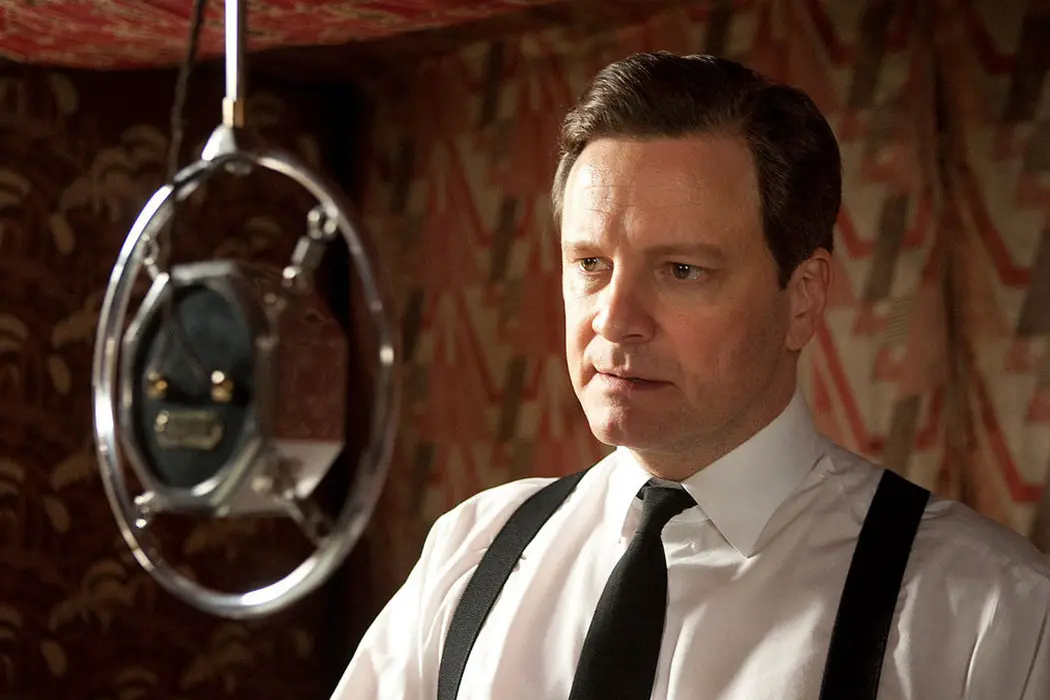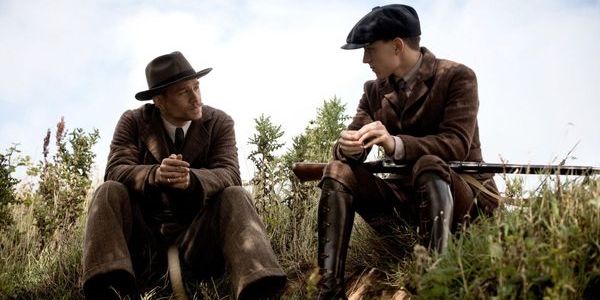From THE KING’S SPEECH to TOLKIEN: The Reductiveness Of The Paint-By-Numbers Biopic

All I know is that Oscar Isaac would make a…
It started in 2011. On the night of the 83rd Academy Awards the two frontrunners for the Best Picture award went for the top prize. Both were biopics, films based on real people: the one about a stammering King tasked with speaking to his nation in its darkest hour and the other about a socially awkward computer prodigy creating the world’s most popular social network.
But there was more than just a statue up for grabs; also being awarded that night was the endorsement of one style of biopic over another: the slightly dry, traditional, down-the-line period drama or the multiple time period, perspective-switching, innovative modern classic. No prizes for guessing which side I was on—the losing one.
The King’s Speech beat The Social Network. Colin Firth won Best Actor for his portrayal of King George VI over Jesse Eisenberg’s Mark Zuckerberg. Tom Hooper was crowned Best Director ahead of David Fincher. And the die was cast. The King’s Speech is not a bad film. It’s pretty good. But the message was sent out that night—if you want awards, this is how you do it. And so we’ve had it—an increase in and celebration of the formulaic over the bespoke, and the emergence of a template biopic, churning out repetitive, rote studio films.
This is the paint-by-numbers method of filmmaking. You know the type: where complex lives are squeezed into a restrictive, hackneyed template, where there’s an overly reverential feel towards its subject, where significant moments are oversimplified. The Theory of Everything. The Imitation Game. Green Book. Bohemian Rhapsody. Tolkien. But what’s so wrong with them, really? They’re successful, aren’t they? And what’s the alternative? Don’t stop me now…
The Presentation of ‘Historical Accuracy’
‘Based on a true story’ is an odd phrase. How many events of someone’s life can you change and still be able to make that claim? How many events can you cut? Must all the major moments of that person’s life be included? Just one or two? Does the truth come from the events of the protagonist’s life or their emotional journey? Is chronology or the sentiment more important?
‘Truth’ and ‘historical accuracy’ are not as straightforward as they seem. Michael Haneke once claimed that ‘Film is 24 lies per second in the service of the attempt to find truth’. Why should this not apply to biopics? Take Rocketman, the story of Elton John’s life. In the opening scene, a middle-aged Elton, dressed as the devil, is transported through memory back in time, standing in the street outside his mother’s home, devil horns n all, while his five-year-old self and the rest of the street dance around him to the beat of ‘The Bitch is Back’.
I would wager this is not historically accurate. Does this make it ‘false’? Is it not an interesting—a cinematic—way to show one recalling memories? Moreover, it immediately tells the audience that you are not about to watch a paint-by-numbers biopic: you’re watching a musical fantasy.

Skip forward a few scenes to where 12-year-old Elton sings ‘I Want Love’, a song which was written when John was 54. What an unbelievable inaccuracy. It’s 42 years too early! A shameful oversight! Yet the emotion of a young John singing ‘I Want Love, but it’s impossible’ about his unloving Dad, followed by his military father singing, ‘I can’t love, shot full of holes’, has a much greater emotional impact.
More than impact, it shows the ‘truth’ of the song much better than it would have had we seen the song in its ‘correct’ place, being performed or penned in 2001, as ‘historical accuracy’ would demand. It’s a lie in the pursuit of truth. In contrast, consciously or not, the paint-by-number model gives the viewer the impression that what you are seeing is the way that it actually happened. These are the rules of painting-by-numbers. This says this so this goes here. This event happened then so it goes here. It tries to stick as close to the formula as possible. This sets up expectations.
Bohemian Rhapsody shifts around events from Freddie’s life just as much as Rocketman does. But where Rocketman tells you from the off that this isn’t playing it by the book, Bohemian Rhapsody, The Theory of Everything, The Imitation Game—the whole gang—doesn’t. So when there’s a change—that the timeline of Freddie’s HIV diagnosis is way off or that Live Aid wasn’t a reunion—it appears as either an oversight or, worse, an attempt to deceive the audience. It doesn’t come across as a storytelling choice. This is why the number of articles decrying the inaccuracies of Bohemian Rhapsody outnumber those complaining about Rocketman.
Think of it like the law. You can break the letter of the law while abiding by the spirit of it. Same applies; it can be much better to portray the spirit of the truth than abide by the letter. If you want pure historical accuracy, watch a documentary.
Oversimplifying The Complex
Craig Mazin, speaking on the Scriptnotes Podcast, claimed that biopics are, ‘more formulaic than the dumbest comedies’, that they are stories of ‘somebody doing something that is impactful to the world… contrasted against a personal drama, such as stuttering [The King’s Speech], ALS [The Theory of Everything] or secret gay [The Imitation Game]. They will always tend to take on this shape’.
One of the biggest drawbacks of The King Speech’s cinematic descendants is their frequent bungled handling of these parallel stories, which tend to fall into one of two camps. The first is the Going Too Far camp, where the life of the protagonist mirrors the thing they are famous for to an absurd level. The second is the Not Going Far Enough camp, where the personal drama and the protagonist’s impact on the world are treated as broadly separate. But both camps are regions of the same country: the state of oversimplification.
Take this year’s Tolkien, the newly crowned Mayor of Going Too Far camp. We can suspend our disbelief towards the clunky repeated references to Tolkien’s friend group as a ‘fellowship’. We can look past the crude comparisons between Tolkien being forced to leave his childhood Shire-like home to move to an industrial, foreboding Mordor-recalling landscape. We might even be able to cringe through Tolkien’s WWI trusty orderly revealing his name to be ‘Sam’.
But the morphing of the battlefield in Tolkien’s mind’s eye into prototype visions of the Nazgul, dragons and members of the fellowship is too reductive to bear. It presents Tolkien’s incredible feats of creativity as the direct result of a few scattered moments from his youth. Does creativity really work this way? Does life work this way? Do we care?

The 2014 Stephen Hawking biopic The Theory of Everything is also a resident of the Going Too Far camp, but instead elects to oversimplify Hawking’s personality, often turning him into a caricature of his famous self. In a scene showing Hawking’s first date with Jane, his later wife, Hawking manages to compare luminescent shirts to the destruction of stars. Who wouldn’t? When Jane later tells Stephen she loves him, Stephen responds, ‘That’s a false conclusion’.
We get it. Stephen Hawking was a scientist. Did science penetrate every part of his lexicon? Do builders refer to bricklaying in their everyday speech, too? Producer 1: ‘How do we make sure the audience knows that Stephen Hawking, the world famous physicist, likes science?’ Producer 2: ‘Maybe make him refer to science, like, all the time?’ Producer 1: ‘Perfect.’
Not content with merely Going Too Far, The Theory of Everything also takes up dual residence in the Not Going Far Enough Camp, oversimplifying the genesis of Hawking’s scientific achievements. Hawking’s black hole theory is diluted to two sudden moments of inspiration: staring into swirling milk in a cup of tea after a lecture and looking into a fire through a jumper he can’t put on. Honestly. And to tell the audience that his theory on the visibility of black holes was proved correct, writer Anthony McCarten chooses to have another physicist stand up and exclaim, ‘I am an expert. He is correct!’.
In Bohemian Rhapsody too, with the exception of ‘Who Wants to Live Forever?’, you’ll scramble to find the links between the band’s personal lives and their creations. This oversimplification isn’t an issue because it shirks historical accuracy; it’s an issue because it feels lazy. It dilutes the achievements of Tolkien, Hawking and Mercury to sudden lightbulb moments. It does them and their legacies a disservice.
So what might a more elegant way of dealing with the parallel stories look like? In Danny Boyle’s 2015 film, with a script from Aaron Sorkin, the link between Jobs’ personal drama and impact on the world is that the latter occurs as a result of the former. Jobs’ need for absolute control is a result of his powerlessness in being abandoned as a child. In The Social Network, also penned by Sorkin, Mark Zuckerberg creates a social network as a result of his character’s desire to better understand and climb the social ladder. The parallel stories are synthesised, not oversimplified.
The Sin of Sanitisation
There is one more form of oversimplification. The worst offender. Actively sought simplification and restriction: sanitisation. The most well documented case is the squeaky-clean-PG-13 Bohemian Rhapsody, which in a parallel universe includes the sex, drugs and general debauchery that Sasha Baron Cohen, originally cast as Freddie, wanted it to.
Picture a version of Steve Jobs that skimped on showing how cold and controlling he could be, or a version of Love & Mercy that overlooked Brian Wilson’s drug taking and mental health struggles. A Tina Turner biopic that didn’t deal with Ike. A Queen biopic that withheld on Freddie Mercury’s sex, drugs—oh.

At best, it’s risk averse. At worst, it’s merchandise. Watch the film then use this code to get 10% off Queen’s Greatest Hits. Book your tickets to Tolkien to really understand Lord of the Rings. Down with it.
Fear of Genre and Form
Imagine Freddie Mercury had never existed. Imagine he was a fictional character. Imagine your character, Freddie, was a world-renowned singer and musician. He was born in Zanzibar in 1946, fronted the band Queen, led a rock star life with periods of excessive sex and drugs, that he was an icon, that he was gay, that he died in 1991—all of it. Now imagine you were to write a screenplay about his life. What genre would it be?
Consider the spate under discussion. What genre are they? Is Tolkien a war film? Is Bohemian Rhapsody a drama? A musical? Instead of committing to a genre built out of the events of the character’s life, there seems to have developed a new, increasingly tepid genre: simply the ‘biographical film’. They share a similar tone. They’re light dramas, telling the story as inoffensively as possible.
If your protagonist’s life is tragic, why not make a tragedy? If your protagonist is a musician, how about a musical? A criminal; a crime film. A sportsman; a sports film. Why should biopics be any different? Arguably the best biopic of all time, Lawrence of Arabia, is an adventure film first, and a biographical story second. Catch Me If You Can is primarily crime thriller. Raging Bull is a drama and a sports film. Walk the Line is primarily a romance. And they’re all the better for it.
I reckon the fear of genre stems from the excessive reverence this group of biopics seem to share for their heroes. If you really lean into your protagonist’s character, warts and all, and let the character drive your genre, you’ll run the risk of showing their vices as well as their virtues. Is that a risk worth taking if you’re Brian May and you understandably want one of your dearest friends to be remembered well? If your aim is to celebrate rather than debate?
Moreover, this fear of genre seems to come attached to a fear of creatively utilising the form of film itself. A Bohemian Rhapsody or a Tolkien seems so focused on simply bringing their characters’ best-known moments to screen that they more often than not forget to do it cinematically.
Look to The Lost City of Z, the 2016 adventure film based on the life of explorer Percy Fawcett. In his five-star review, critic Robbie Collin hails a particular shot where Percy is standing ‘on the prow of a low hill, watching his boy shoot rabbits. The older man… has become a small silhouette in his own story as he watches his son race to the foreground… it’s one of the most acute and overpowering expressions of fatherhood I’ve ever seen’.

Naturally most biopics won’t elect to tell their protagonist’s story through striking visual metaphor. Aaron Sorkin conveys character change through sharp dialogue. Todd Haynes cast different actors to characterise different aspects of Bob Dylan’s personality in I’m Not There. How do The King’s Speech’s offspring choose to utilise the form to depict their character development? Unfortunately, much in the same predictable way: by oversimplification of character, of storyline and of image.
Would things be different had The Social Network won in 2011? Maybe not. Regardless, take hope. There are those fighting the innovative cause. Vice is a mostly successful stab at creatively presenting the lives of Dick and Lynne Cheney. Rocketman is a cheesy musical joy. First Man dives into Neil Armstrong’s lesser-known inner space to add emotional weight to his well-known journey into outer space.
Haneke was right: films are lies in the pursuit of truth. Let’s embrace the lies. This is the movies, after all.
What do you think? Do you agree that recent biopics have become formulaic? Or is it all just personal preference? Let us know in the comments below.
Does content like this matter to you?
Become a Member and support film journalism. Unlock access to all of Film Inquiry`s great articles. Join a community of like-minded readers who are passionate about cinema - get access to our private members Network, give back to independent filmmakers, and more.













